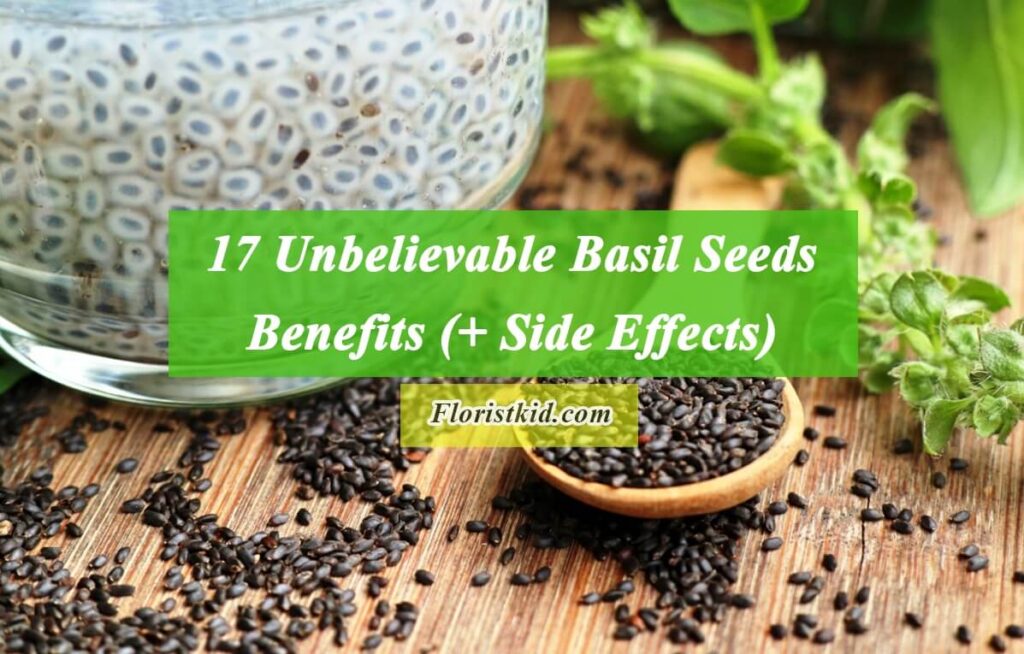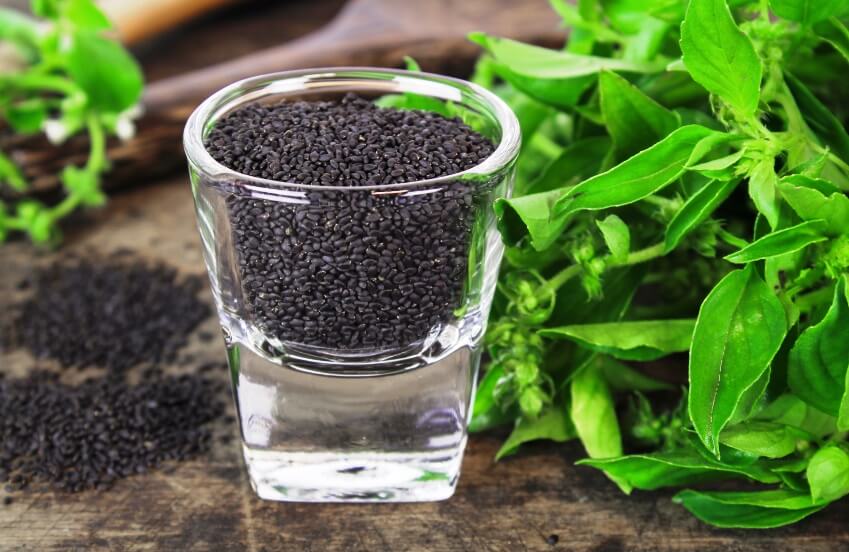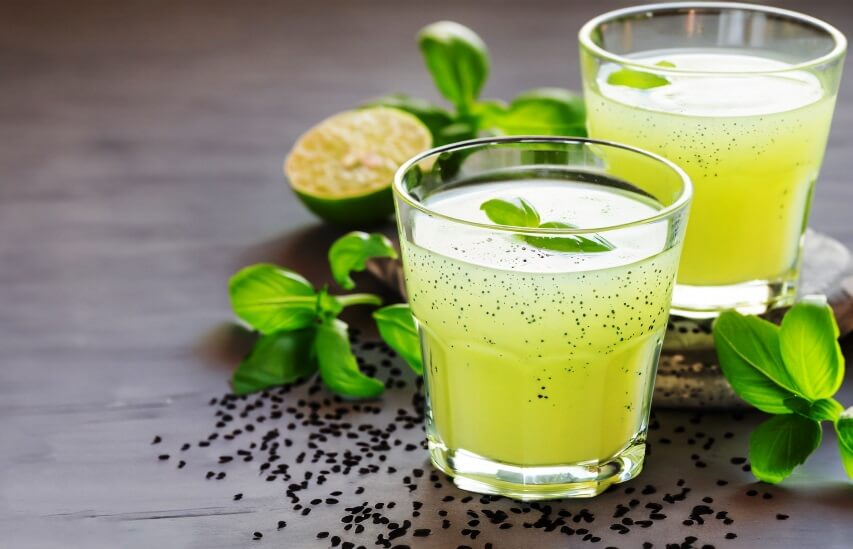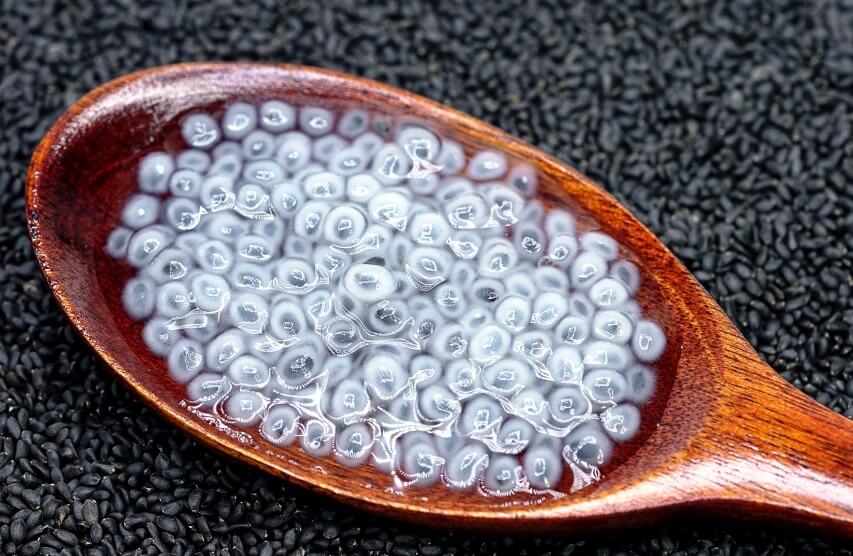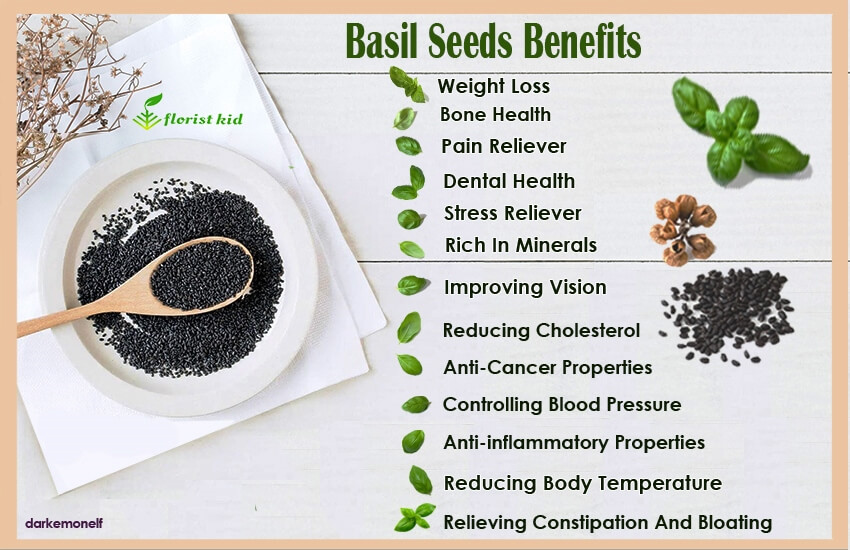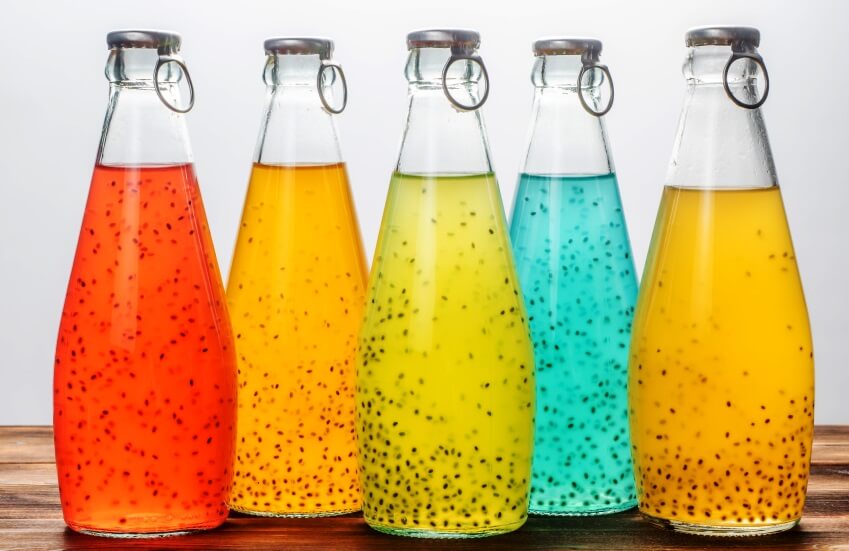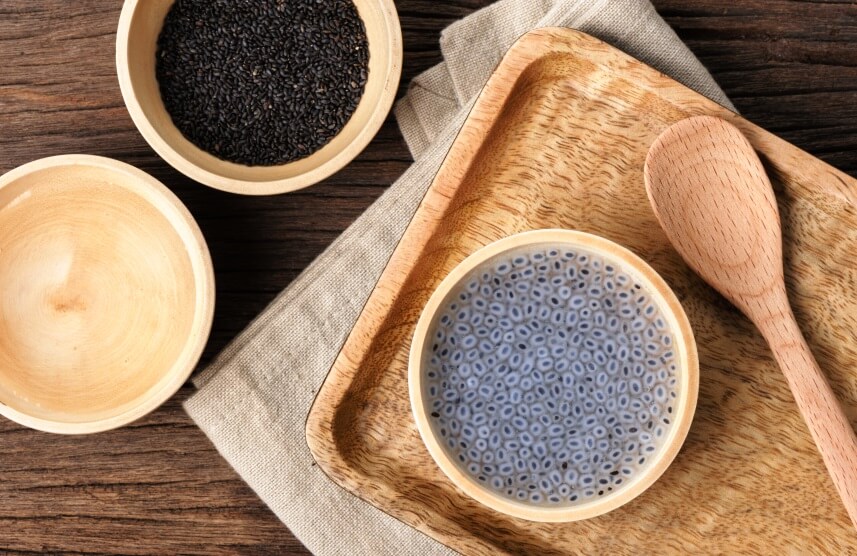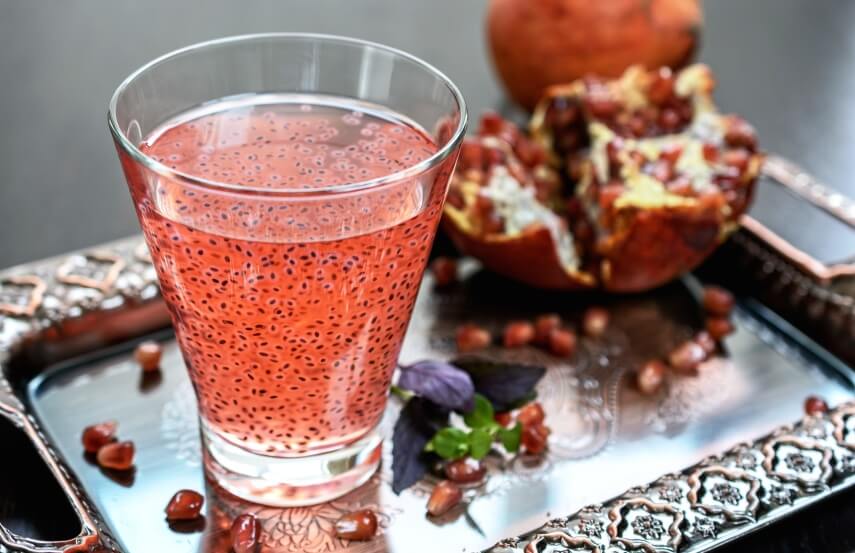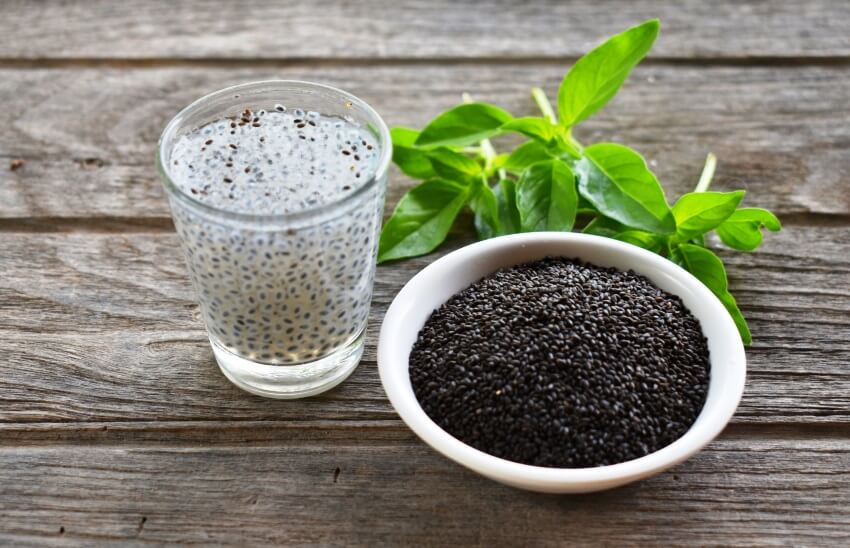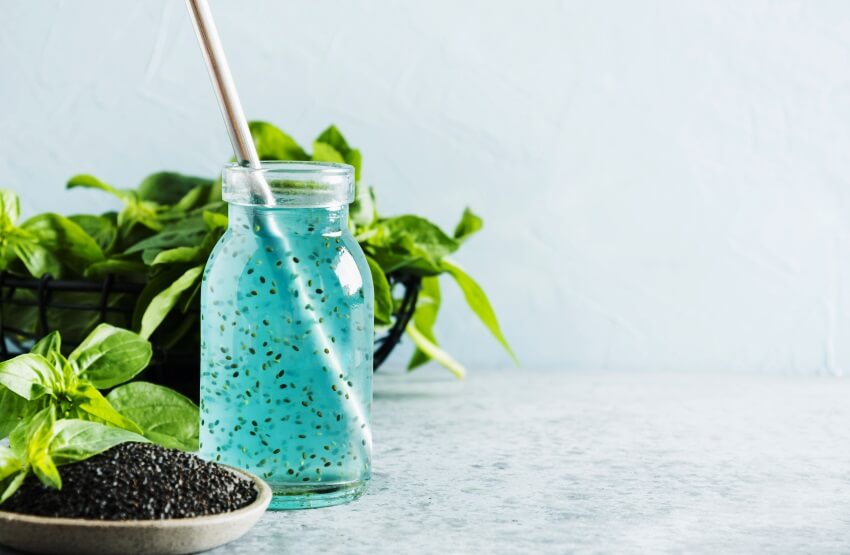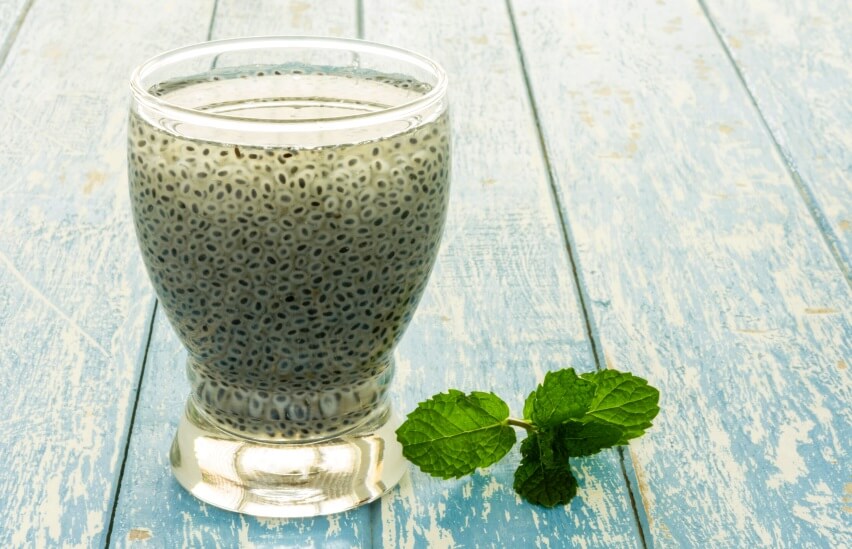Basil seeds (sabja) have a unique texture and flavor, making them a popular ingredient in food and beverage recipes. Basil seeds are a useful ingredient due to their high dietary fiber content. Sabja seeds have emulsifying, foaming, thickening, stabilizing, viscosity, and gelling properties. As a result, they are often used as a source of dietary fiber in beverages, ice creams, and confectionery products.
These tiny seeds are a complete diet for optimum health as they are abundant in many essential health components. The following article will concentrate on basil seeds’ health benefits and also it’s side effects. Continue reading to learn why and how to benefit most from basil seeds for your health.
If you are interested in this topic , you can also read
<<Papaya Seeds Benefits>> and <<Dill Seeds Benefits>> articles.
About Basil seeds
Basil (Ocimum basilicum), commonly known as sweet basil, is an annual herb of the Labiatae family. This plant is of tropical origin and has been growing in Pakistan, India, and Southeast Asia for 4000-5000 years. Basil seeds are oval, small, and porous, and their size varies depending on the region and country of cultivation.
The small, black seeds of the sweet basil plant are rich in nutrients and have been used in traditional medicine for centuries. Basil seeds are hard when dry, but when soaked in water, they absorb liquid and expand, creating a crunchy texture. Basil seeds can absorb up to 10 times their weight in water, making them a popular beverage ingredient.
Nutritional Value Of Basil Seeds
When considering nutritious food choices, basil seeds may not come to mind initially. However, these tiny seeds, popularly known as “sabja” or “tukmaria” in India, have been consumed for centuries due to their impressive nutritional value and health benefits. Let’s learn more about the nutritional value of basil seeds and why they should be included in your daily diet. In the table below, you can find the Physico-chemical composition of basil seeds [1]:
Nutritional Value Of Basil Seeds
| Compound | g/100 g seed |
| Moisture | 8.5 |
| Protein | 9.4 |
| Fat | 33.1 |
| Ash | 5.4 |
| Fiber | 42.45 |
| Carbohydrates | 43.6 |
| Dietary Fiber | 40.85 |
| Minerals | mg/100 g seed |
| Calcium | 636 |
| Iron | 2.27 |
| Magnesium | 31.55 |
| Phosphorus | 19.05 |
| Potassium | 481 |
| Sodium | 2.01 |
| Zinc | 1.58 |
| Copper | 1.21 |
| Manganese | 1.01 |
| Vitamins | µg/100 g seed |
| VitaminA | 1583 |
| Vitamin E | 779 |
| Vitamin C | 1837 |
| Vitamin B1 | 640 |
| Vitamin B2 | 380 |
| Niacin | 72 |
| Folate | 68 |
Rich Source Of Essential Nutrients
Basil seeds are bursting with essential nutrients that contribute to overall good health and well-being. These tiny seeds are a great source of dietary fiber, containing both soluble and insoluble fiber. Consuming adequate fiber aids in promoting digestion, preventing constipation, and maintaining healthy blood sugar levels. Furthermore, basil seeds contain vital minerals such as magnesium, calcium, iron, and phosphorus. These minerals play a fundamental role in various bodily functions, including bone health, muscle contraction, nerve function, and energy production.
Omega-3 Fatty Acids
Omega-3 fatty acids, well-known for their heart-healthy benefits, are also present in basil seeds. These essential fatty acids help reduce inflammation, support brain health, promote cardiovascular health, and enhance overall cognitive function. Incorporating basil seeds into your diet can be a convenient way to boost your omega-3 intake, especially for those who do not consume fish or other seafood regularly.
Full Of Antioxidants
Basil seeds are rich in antioxidants, which play a pivotal role in neutralizing harmful free radicals and preventing oxidative stress within the body. Antioxidants help protect the body against chronic diseases, support healthy aging, and boost the immune system. The high antioxidant content in basil seeds allows them to contribute to a stronger immune response and improved overall health.
Diet Complementary Protein
Basil seed contains significant levels of important amino acids like glutamic acid, threonine, and arginine, making it a reliable protein source. Combining basil seed proteins with cereal proteins will help boost the quality of proteins by providing all the essential amino acids needed by the body. Basil seed can be used to make basil seed protein isolate. The isolates can be used in food formulations because they have useful properties. This ingredient is stable and works well in food because it can create foam and mix well with other ingredients.
Uses Of Basil Seeds
In Indian, Thai, and Vietnamese cuisine, basil seeds are used as a versatile ingredient. They are used as a texture or thickener in food and have a mild, nutty flavor. In addition, they are used as a seasoning for soups, baked goods, salad dressings, and beverages. By soaking basil seeds in water for a while, they become gelatinous. This gelatinous product can give a distinctive texture to drinks, desserts, salad dressings, bread dough, cake dough, and soup seasoning.
Basil seeds are also suitable for biodegradable films and food packaging due to their high tensile and deformation capacity. In polluted waters, they can absorb metals such as copper, cesium, and strontium and act as a secondary reservoir of selenium. Heavy metals in the soil can affect Basil morphology, biomass, and oil content. More research is needed to determine whether heavy metals are present in basil seeds of different regions [2].
Health Benefits Of Basil Seeds
Basil seeds are a great food source and have many health benefits. They are an excellent source of fiber, antioxidants, vitamins, and minerals. In the following section, we will go through some of the most important health benefits of sabja seeds [3]:
Rich In Minerals
Minerals such as calcium, potassium, magnesium, iron, and folic acid are abundantly found in Basil seeds. Hence, basil seeds help the health of teeth and bones. In addition, they strengthen hormones and enzymes and stimulate brain activity.
Anti-inflammatory and Anti-Cancer Properties
Basil seeds contain active compounds such as flavonoids that have anti-inflammatory and anti-cancer activities. They also help prevent cancer from spreading and protect your cells from damage.
Weight Loss
The alpha-linolenic acid and omega-3 fatty acids are abundant in Basil seeds. These components can increase the body’s metabolic capacity to burn fat. In addition, they contain fiber, which makes a person feel full for longer and prevents hunger, which ultimately helps in weight loss.
Reducing Cholesterol
Sabja seeds aid in lowering levels of harmful cholesterol. Low cholesterol levels reduce the burden on the heart and reduce the risk of heart attack and stroke, as well as the risk of atherosclerosis, plaque formation, and high blood pressure.
Controlling Blood Sugar Level
Dietary fibers in basil seeds can regulate blood sugar levels. They are beneficial for type 2 diabetes since they seem to regulate blood sugar levels. They slow down the body’s metabolism, which in turn regulates the rate at which carbohydrates are converted into glucose. A morning glass of water with basil seeds can increase insulin sensitivity throughout the day.
Controlling Blood Pressure
Basil seeds contain potassium, which directly affects blood pressure by dilating blood vessels, reducing tension in arteries and blood vessels, and reducing stress on the cardiovascular system.
Improving Bone Health
The elements in basil seeds, including iron, potassium, copper, calcium, manganese, and magnesium, increase the density of bone minerals and, at the same time, reduce the incidence of osteoporosis and preserve youthful energy.
Improving Vision
Since basil seeds contain substantial amounts of vitamin A, people with poor vision or high levels of oxidative stress can include them in their diet. In the retina, vitamin A acts as a powerful antioxidant that prevents cataracts and delays the onset of macular degeneration.
Helping Dental Health
Due to anti-fungal, anti-bacterial, anti-viral, and anti-microbial properties, basil seeds prevent the formation of plaque, cavities, bad breath, and mouth ulcers. You can freshen your breath by chewing some basil seeds.
Pain Reliever
Basil seeds can relieve pain and also reduce the severity of conditions such as arthritis, gout, headaches, and irritable bowel syndrome. Since ancient times, basil seeds have been used for their anti-inflammatory and pain-relieving properties. They can reduce swelling and inflammation and also plaque growth in blood vessels.
Stress Reliever
Basil seeds improve mood and reduce symptoms of depression.
Reducing Body Temperature
Basil seeds are one of the optimal body coolers and are a great drink to cool down during intense heat. In Asian countries, basil seeds are used to make drinks with water, sugar, honey, and other ingredients. The sabja seeds soothe upset stomachs and help keep drinks cool.
Relieving Constipation And Bloating
Basil seeds aid in the body’s natural detoxification and as a stomach cleanser to help remove toxins from the stomach. These seeds contain volatile oils that help digestion and expel gas from the digestive system.
Basil Seeds Benefits For Skin
Due to the presence of antioxidants and flavonoids, basil seeds improve skin health by promoting cell growth. When crushed in coconut oil, they can treat skin conditions, including eczema and psoriasis. Basil seeds are a powerful anti-aging diet as they continuously stimulate the production of collagen, which repairs damaged skin cells and helps the skin maintain its elasticity.
Basil Seeds Benefits For Hair
Basil seeds are rich in iron and antioxidants, promote hair growth, and protect against premature hair loss. They also protect against oxidative stress and inflammation, keeping your hair beautiful and healthy. Sabja seeds are rich in protein and vitamin K and are beneficial for hair health.
Sabja Seeds Benefits For Female
Sabja seeds can be beneficial for women because they reduce estrogen levels. Women with too much estrogen in their menstrual cycle can relieve their excessive bleeding by consuming basil seeds.
basil seeds also play an important role in regulating menstrual and hormonal cycles since they are rich in vitamins, minerals, and omega-3 fatty acids.
Sabja Seeds Benefits For Male
In traditional medicine, basil seed tea is widely used to awaken dormant libido in men. It increases male fertility because it improves sperm quality.
Basil Seeds Side Effects
Consuming sabja seeds provides many health benefits. However, overusing basil seeds may lead to side effects listed below:
- Nausea, diarrhea, bloating, Acne, acid reflux, headache, stomach pain, and loss of appetite are possible symptoms of overconsuming basil seeds.
- Excessive consumption of basil seeds may lower blood sugar.
- Overconsumption of basil seeds can reduce blood pressure below the recommended level and lead to several significant issues.
- The consumption of basil seeds by young children may cause throat sticking.
- Basil oil and seeds shouldn’t be consumed if you’ve recently had surgery or are injured as they may prevent blood clotting.
Sabja Seed Side Effects For Females
Sabja seeds may be beneficial for women by controlling menstrual health and cooling the body if consumed in the right amount. However, consuming sabja seeds during pregnancy is not recommended as they may suppress estrogen levels in the body.
How To Incorporate Basil Seeds Into Your Diet?
Including basil seeds in your daily routine is simple and versatile. To unleash their nutritional potential, follow these easy steps:
- Soaking: Soak 1 tablespoon of basil seeds in 1 cup of water for about 10-15 minutes until they form a gel-like consistency.
- Add To Beverages: Stir the soaked basil seeds into your favorite smoothies, juices, or herbal drinks to add texture and boost nutritional value.
- Top It: Sprinkle the soaked basil seeds onto yogurt, oatmeal, cereal, or salads for an extra crunch and added nutrients.
The Daily Intake Of Basil Seeds
One or two tablespoons of sabja seeds per day are suggested amounts.

